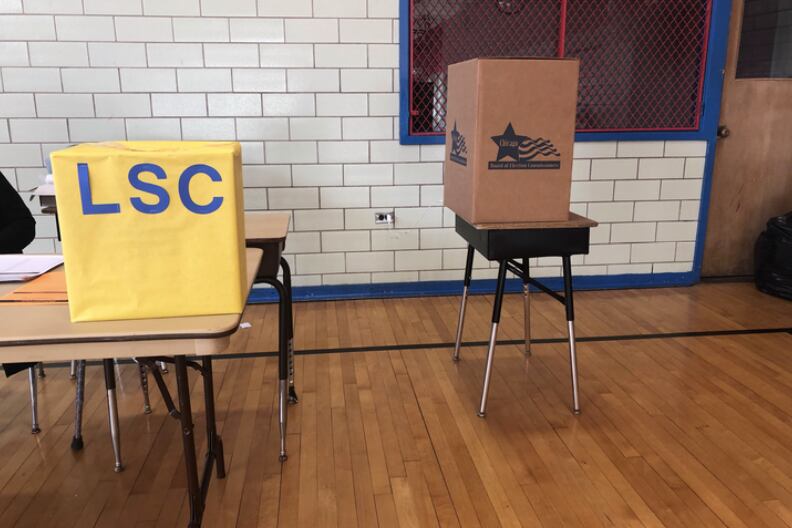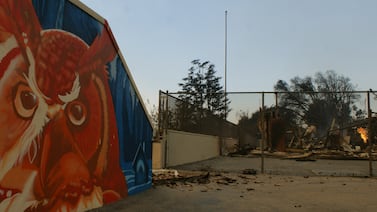Sign up for Chalkbeat Chicago’s free daily newsletter to keep up with the latest education news.
There’s a uniquely Chicago election happening this week: Local School Councils.
Every resident of the city is able to vote — either as a community member or at the school where they work, attend, or have a child enrolled. (More on that below.)
The elections take place at all Chicago Public Schools from 6 a.m. until 7 p.m. Voting at elementary schools takes place Wednesday, April 10 and at high schools on Thursday, April 11.
Elementary schools also have parent-teacher conferences on Wednesday and kindergarten through eighth grade students are off. High school parent-teacher conferences are Thursday, and there’s no school for high school students.
Originally established in 1988, each district-run school in Chicago Public Schools has a Local School Council, or LSC, traditionally made up of six parents, two teachers, two community members, a student, and the school’s principal.
LSCs can be an important vehicle for parent and community voice and power. Their primary duties are approving school budgets, crafting school improvement plans, and selecting and evaluating the principal. In recent years, they’ve also had the power to decide whether or not to staff police officers at schools — a decision that the school board is now planning to make unilaterally.
More than 17,000 candidates ran in the first LSC elections in 1989, but those numbers have declined to just over 6,000 applicants in 2022. Turnout in 2022 rebounded, reaching its highest level since 2010 and after a slump in 2020 amid the COVID pandemic.
But in many cases, LSCs suffer from persistent vacancies. For several years, LSCs at low-performing schools lost much of their decision-making power.
The looming shift to an elected Chicago Board of Education with 21 members has the potential to overshadow LSCs or reinvigorate them.
Here’s more on how to participate in these hyperlocal elections:
Who can vote?
Anyone in Chicago can vote for up to five candidates at their local schools. In order to vote, you just need to live within a school’s attendance boundary or voting district. Schools without a neighborhood boundary – such as magnet and selective enrollment schools — do have a boundary drawn for the purposes of LSC voting.
There may be multiple schools where you can cast a vote, and you can search your address using this tool to find out where you are eligible to vote. A CPS spokesperson said to double check with the school if you’re unsure.
All students, parents, and guardians of students enrolled at a school may vote at that school, even if it’s outside their neighborhood.
All staff who work more than part time at a school can also vote at the campus where they work. Teachers and staff can vote for up to two candidates for teacher or staff representative.
Students are eligible to vote for their school’s student representative.
How do I vote?
Voting takes place at school buildings all day on Wednesday at elementary schools and Thursday at high schools. If you’re a parent or school staff member, you can cast a ballot while you’re at the school for parent-teacher conferences, which are also taking place on those respective days. Many schools do offer virtual conferences, but LSC elections could serve as an incentive to go in person.
If you’re a community member interested in voting, you can look up where you’re eligible to vote and cast a ballot at any of the schools that show up.
Erykah Nava is running for parent representative at Lloyd Elementary in Belmont-Cragin where her daughter is in third grade. She’s been reminding people to make sure they mark an X on the ballot by the names of the candidates they want to elect. District officials say any other mark will not be counted as a vote and will result in your entire ballot being thrown out.
Two forms of identification are needed. For parents, one must establish you are the parent or legal guardian of a student enrolled.
Why vote for the Local School Council?
Local School Councils were created to empower communities and parents to improve their schools. They “represent bottom up democracy, participatory grassroots democracy,” said Michael Brunson, a community representative at Harlan High School, member of the district’s LSC Advisory Board, and former recording secretary for the teachers union.
“I can’t think of a better introduction to politics than the Local School Council,” Brunson said, adding that a handful of the city’s current aldermen once served on an LSC.
Chicago will soon begin electing people to the Chicago Board of Education, which will expand to 21 members in 2025. But Brunson said “an elected school board is not the answer to all problems.”
Nava said she sees LSCs as complementary to the soon-to-be elected school board.
“I think having the super hyper local accountability and then having more wider citywide accountability, I think those can work very well hand in hand,” Nava said.
Even though some LSCs struggle to fill all their seats, there are competitive races at many schools.
Josh Levin is running for re-election as a community representative at Brentano Elementary, which has more candidates than seats this year. Levin attended Brentano as a child and his dad served on the LSC at Whitney Young Magnet High School in the 1990s.
“It’s always been a funny little governing body,” Levin said. “The ones that work, I think, help contribute to their schools and make a difference.”
Correction: A previous version of this article incorrectly stated when Levin’s father served on the LSC at Whitney Young Magnet High School. It was during the early 1990s, not the inaugural LSC in 1989.
Becky Vevea is the bureau chief for Chalkbeat Chicago. Contact Becky at bvevea@chalkbeat.org.







